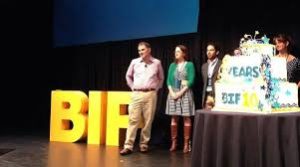By Rachel Happe, Co-Founder of The Community Roundtable.
 Going to BIF10 was a treat for me. My life is full of demands – running a business, mothering a small child and attempting to keep dinner on the table can get in the way of investing in myself… yet it is mentally draining and I recognized that I had to feed myself in order to keep feeding others. BIF, I hoped, would be some sorely needed brain candy and it did not disappoint.
Going to BIF10 was a treat for me. My life is full of demands – running a business, mothering a small child and attempting to keep dinner on the table can get in the way of investing in myself… yet it is mentally draining and I recognized that I had to feed myself in order to keep feeding others. BIF, I hoped, would be some sorely needed brain candy and it did not disappoint.
I wasn’t sure what to expect – seeing the focus on storytelling did not really capture what I heard about it. What I found was that for me BIF is a conference about using love as a platform and springboard for potential. You might think this is a strange statement coming from me – I am analytical, use the language of business, can be a bit remote and introverted and am not particularly compassionate. I always thought of love as this vague, indefinable thing. BIF helped me to see that love is the actions of seeing, encouraging and supporting the potential of others.
Love was demonstrated by everyone we heard from –
- David Bolinsky, a medical illustrator who happened to sit next to an extraordinary young woman in China and instead of moving on, reaching out and investing time to help her thrive.
- Matthew T. Fritz, a career military leader who instead of telling Afghans everything the U.S. knows about building an air force, stopped to ask them what they needed and wanted first – and built up from there.
- Cheryl Dahle, a person who felt broken by abuse, giving herself the permission to ask for and look for what she needed – and then moving on to use that pain to drive her work – understanding that complex environmental issues are not lost causes.
- Angela Blanchard, a visionary entrepreneur who has spent her life revealing the value of people and communities by listening, appreciating and showing them their own potential – and in so doing, enabling them to thrive.
Some of the insights these stories revealed to me are this:
- One person is not enough. The stories suggest that individuals don’t understand or appreciate what makes them exceptional until someone else really sees their unique value and its significance – and spends the time to encourage that in them.
- Love is an action. It’s the cup of coffee my husband brings me every morning. The attention you pay to someone when they speak. The introductions you make that are relevant to both people because you took the time to understand what each needs and values. The lunch you make for your kids every day. Love is, in fact, not ambiguous or abstract – it is quite tangible.
- The best solutions are built on love. This is a weird and odd concept to a lot of organizations, which speak the language of efficiency, productivity and revenue…. but the reality is that those all flow from people who feel secure enough – because they have love and support – to risk pushing further. You want engaged employees? You must figure out how to create a platform of love and support for each employee. You don’t have to call it love but you do need to figure out how to make them feel significant, secure and valued for their uniqueness.
- Being challenged can be an expression of love. Those who challenge us push us to do better and be better are often the trigger for action. Challenge may come from the parent who remains unimpressed, the boss who asks the deeper question or the colleague who presents us with an alternative perspective.
- It’s up to you to be seen. No one can help you if you do not want to be helped. You have to first be vulnerable and open, in some way, so that others can really see you. Tell your story, write about what you think or share your fears with your friends. Without this first step you cannot find the people that will help show you your own potential.
It was an amazing treat to participate and as much as Saul Kaplan doesn’t seem to want thanks – he has created the conditions for these amazing people to tell their stories and has curated an audience that can hear and appreciate what they have to share. In my parlance he is a master community builder – as is the team that he has assembled. I didn’t get the opportunity to meet him but want to thank him, Renee Hopkins and the rest of the BIF team for creating a community dedicated to exploring and solving problems that matter.
